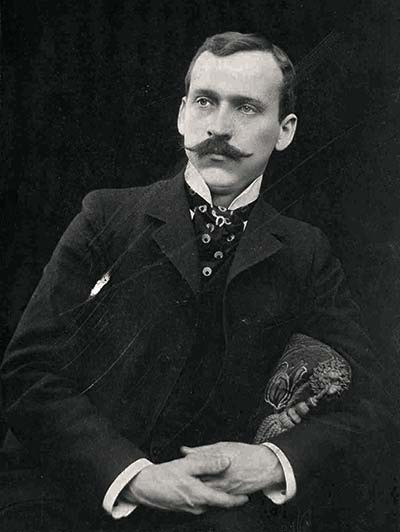
Pāvuls Jurjāns
(22.02.1866 - 06.01.1948 )
Pāvuls Jurjāns was a singer, composer, conductor, pedagogue, music critic and collector of folk songs. He was also the first professional Latvian vocal teacher and the founder of the Latvian Opera. He contributed greatly to the educating of concert and opera singers and the founding and direction of the Latvian Opera musical theatre and symphony hall (1912–1915); he also promoted the activities of choirs and singing in the schools, which encouraged him to write arrangements for folk songs. He wrote approximately 100 arrangements of folk songs for mixed and men’s choirs and another 100 or so arrangements for children’s choir as well as many arrangements of music for use by schools.
Jurjāns was born on February 22, 1866, on the “Meņģeļi” farmstead in Ērgļi administrative parish. He received his first training in music at the Kharkov Music School, where his brothers Andrejs and Juris taught. He graduated from the French horn class taught by his brother Juris (1861–1940) in 1890 and played in the local opera theatre and concert halls for the next two years. Jurjāns then relocated to Saint Petersburg, where he studied singing and choir conducting at the conservatory under A. Kotonyi from 1892 until 1898, graduating with a freelance artist diploma. Riga audiences were introduced to Jurjāns’ voice in 1893 during the Autumn Concerts series. He continued to perform at these concerts after finishing his studies. “Each note in Pāvuls Jurjāns’ concerts is well thought out; he has, as they say, style,” wrote composer Emils Dārziņš in 1902. Jurjāns went on to work in a variety of capacities in Riga: he taught singing, was a virtuoso French horn player as well as singer, directed choirs, was a principal conductor at the 5 th General Latvian Song Festival and an honorary principal conductor at the 6 th General Latvian Song Festival, and served on the Choir Wars jury at the 5 th Song Festival.
In 1906, Jurjāns began organising concerts performed by his students, which generated great interest in the public and eventually became a tradition. Dārziņš credited Jurjāns with organising two of the first concerts of Latvian symphonic music; these took place in 1902, featured the choir of the Vidzeme teachers’ welfare association and German symphonic orchestras, and performed the most notable symphonic works and cantatas of the day (by Jāzeps Vītols, Andrejs Jurjāns and Dārziņš himself). The three concerts of Latvian symphonic music organised by Jurjāns in Majori in the summer of 1906 were particularly significant in the development of Latvian music. One of these was dedicated to the compositions of Vītols, the other to the compositions of Andrejs Jurjāns. Musicologist Jēkabs Vītoliņš wrote that these concerts “gained the great support of society but ended in unprecedented scandal, when the orchestra’s German administration cancelled the third concert on the very day of the event.” This was an unexpected and undeserved slap on the face not only for the Latvian artists but for the Latvian nation as a whole. The concert we rescheduled a few weeks later at the Riga Latvian Society hall in Riga and featured music by Vītols, Andrejs Jurjāns, Dārziņš and Alfrēds Kalniņš.
During these years, Jurjāns also taught singing at several schools in Riga: the Voldemārs Maldonis, Ķeniņš and Riga Latvian Society girls’ schools, the Riga City Gymnasium and the Riga Imperial Music School from its founding in 1904 until 1915, where he taught singing as well as opera.
Although the New Latvian Theatre founded in 1902 paid much attention to opera, the issue of establishing a separate Latvian opera became increasingly urgent. These efforts began with the 1907 production of Eugene Onegin performed by Jurjāns’ students. This same work was performed for the first time in the Latvian language on December 27, 1912. With Jurjāns’ students as soloists, the Riga Latvian Society choir also took part in the production, which Jurjāns had entrusted to the German theatre director W. Pezold. The performance generated much interest in society. Jurjāns also produced The Demon later that year. Again, audiences expressed great interest, the performances sold out, and therefore Jurjāns decided to organise an independent Latvian opera theatre. All the preparations were completed in early 1913, and the first performance by the newly founded theatre, Tchaikovsky’s Eugene Onegin, took place on September 8 of that same year. Over the next two and a half years, the theatre produced twelve operas popular at that time: Eugene Onegin, Hansel and Gretel, La traviata, Ivan Susanin, The Queen of Spades, Rigoletto, Carmen and others. During the First World War, Jurjāns organised a symphony orchestra of the 2 nd Latvian Riflemen Brigade in an attempt to keep his opera musicians together. Although the Latvian Opera was eventually forced to halt its activity, a serious, professional foundation for opera in Latvia had been laid.
In 1919, the Latvian Conservatory was founded by Jurjāns along with Vītols, Ludvigs Bētiņš, Nikolajs Alunāns and others. Jurjāns led the singing class at the conservatory for many years and became a professor in 1927. Jurjāns’ oeuvre as a composer is quite extensive: twelve works of symphonic music, five vocal-instrumental works, three works of chamber music, eleven solo songs, two arrangements of folk songs for solo voice, fourteen original songs for mixed choir and fifteen original songs for men’s choir. In his compositions he developed diatonism and textural techniques characteristic of Latvian folk music, such as singing with drone, placing voice groups in opposition to each other and certain types of variation, all the while preserving the melodic character and natural flow of the folk songs.
Jurjāns was awarded the Order of the Three Stars 3 rd Class in 1926 and became a Meritorious Artist of the Latvian SSR in 1945.
He died on January 6, 1948.
